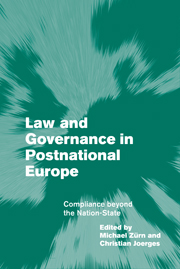Book contents
- Frontmatter
- Contents
- List of tables
- Notes on contributors
- Preface
- 1 Introduction: Law and compliance at different levels
- 2 The analysis of compliance with international rules: Definitions, variables, and methodology
- 3 State aid control at the national, European, and international level
- 4 Domestic limits of supranational law: Comparing compliance with European and international foodstuffs regulations
- 5 Politics of intergovernmental redistribution: Comparing compliance with European and federal redistributive regulations
- 6 Conclusions – the conditions of compliance
- 7 Compliance research in legal perspectives
- References
- Index
1 - Introduction: Law and compliance at different levels
Published online by Cambridge University Press: 22 September 2009
- Frontmatter
- Contents
- List of tables
- Notes on contributors
- Preface
- 1 Introduction: Law and compliance at different levels
- 2 The analysis of compliance with international rules: Definitions, variables, and methodology
- 3 State aid control at the national, European, and international level
- 4 Domestic limits of supranational law: Comparing compliance with European and international foodstuffs regulations
- 5 Politics of intergovernmental redistribution: Comparing compliance with European and federal redistributive regulations
- 6 Conclusions – the conditions of compliance
- 7 Compliance research in legal perspectives
- References
- Index
Summary
Is law – understood as a normatively meaningful form of social regulation – conceivable or indeed possible beyond the nation-state? This is the guiding question that informs our inquiries in Law and Governance in Postnational Europe: Compliance beyond the Nation-State. It is based on the conviction that governance beyond the nation-state must contain elements of law if it is to be considered legitimate. The focus therefore is on compliance as an element of social order, not only as a means of effective problem-solving. We will demonstrate that a record of good compliance in multilevel systems does not depend on an agent that is generally able to enforce rules on the basis of a superior availability of material resources. Our case studies show that with respect to some regulations the EU displays better compliance records than comparable regulations in the Federal Republic of Germany. Even compliance with WTO regulations can be compared favorably with compliance with German regulations. A high degree of legalization, combined with well-functioning verification and sanctioning systems, seems to be more important. However, smart institutional designs can cause their own problems. If the intrusions into the constituent units of a multilevel system are too strong and compliance works too well, then compliance crises may result, which involve an open, normatively-driven rejection of the regulation. This is especially true if social integration lags behind and a common public discourse is absent.
- Type
- Chapter
- Information
- Law and Governance in Postnational EuropeCompliance Beyond the Nation-State, pp. 1 - 39Publisher: Cambridge University PressPrint publication year: 2005
- 14
- Cited by



